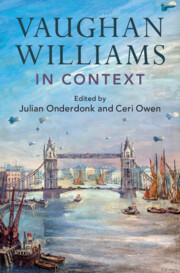Book contents
- Vaughan Williams in Context
- Composers in Context
- Vaughan Williams in Context
- Copyright page
- Dedication
- Contents
- Illustrations
- Graphs and Tables
- Musical Examples
- Notes on Contributors
- Acknowledgements
- Editorial Note
- Bibliographic Abbreviations
- Introduction
- Part I Biography, People, Places
- Part II Inspiration and Expression
- Part III Culture and Society
- Part IV Arts
- Part V Institutions
- Part VI Reception
- Chapter 29 Reception Outside England, 1901–1914
- Chapter 30 Interwar Continental Reception
- Chapter 31 Early Recordings
- Chapter 32 Reception in the USA:
- Further Reading
- Index of Works
- General Index
Chapter 30 - Interwar Continental Reception
from Part VI - Reception
Published online by Cambridge University Press: 28 March 2024
- Vaughan Williams in Context
- Composers in Context
- Vaughan Williams in Context
- Copyright page
- Dedication
- Contents
- Illustrations
- Graphs and Tables
- Musical Examples
- Notes on Contributors
- Acknowledgements
- Editorial Note
- Bibliographic Abbreviations
- Introduction
- Part I Biography, People, Places
- Part II Inspiration and Expression
- Part III Culture and Society
- Part IV Arts
- Part V Institutions
- Part VI Reception
- Chapter 29 Reception Outside England, 1901–1914
- Chapter 30 Interwar Continental Reception
- Chapter 31 Early Recordings
- Chapter 32 Reception in the USA:
- Further Reading
- Index of Works
- General Index
Summary
This chapter provides an introduction to how Vaughan Williams’s music was received in interwar continental Europe, particularly within music magazines and scholarly periodicals. It is in two sections. The first considers the different contexts in which it was heard: choral performances of the Mass and folk-song arrangements, pieces played at International Society for Contemporary Music (ISCM) festivals, and performances of large-scale works in ‘seasonal’ orchestral concerts and recitals. For the most part, Vaughan Williams’s music was well received, even at ISCM festivals, where he might have been overshadowed by more radical figures; and the increased number of European performances that he received during the period reflected a growing interest among leading continental performers. The chapter then examines some of the writing on Vaughan Williams by continental critics, primarily those from France and Germany. These reveal two contrasting but not necessarily mutually exclusive narratives: one in which Vaughan Williams is presented as the leader of a new English school of composition that is underpinned by the language of English folk song, and another in which Vaughan Williams is considered in a pan-European context, where the influence of French impressionism is more keenly felt. A table of selected performances is also included.
Keywords
Information
- Type
- Chapter
- Information
- Vaughan Williams in Context , pp. 259 - 268Publisher: Cambridge University PressPrint publication year: 2024
